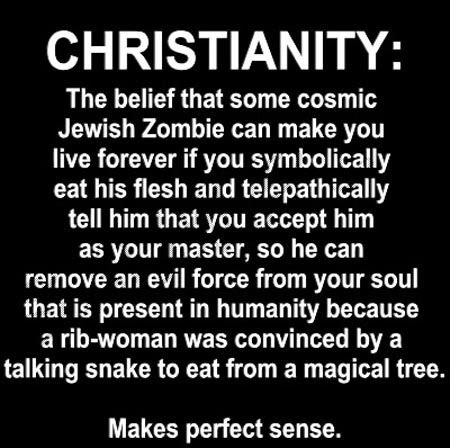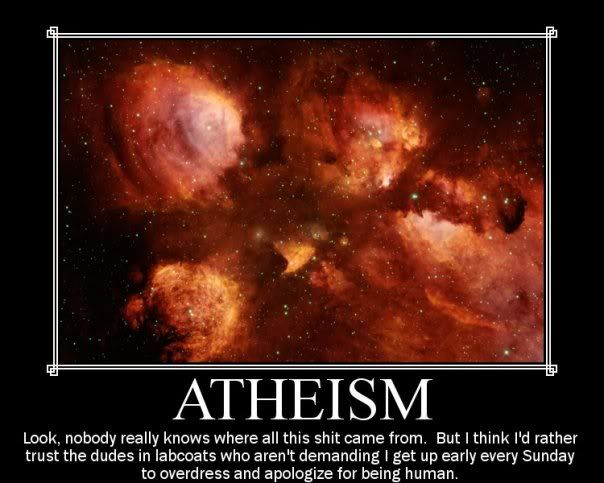Christianity - synopsis
Posted: Thu Jul 31, 2008 1:17 am

Internet Mormons, Chapel Mormons, Critics, Apologists, and Never-Mo's all welcome!
https://discussmormonism.com/


Droopy wrote:Goodk, start drinking heavily. Its your one last hope.


It's interesting how often in the Old Testament that Gentiles are an important part of God's plan. Where does it say in the Bible that all other religions are completely wrong? I suggest that you read Acts 17:28.GoodK wrote:
Now what Dyson and Tolkien showed me was this: that if I met the idea of sacrifice in a Pagan story I didn't mind it at all: again, that if I met the idea of a god sacrificing himself to himself . . . I like it very much and was mysteriously moved by it: again, that the idea of the dying and reviving god (Balder, Adonis, Bacchus) similarly moved me provided I met it anywhere except in the Gospels. The reason was that in Pagan stories I was prepared to feel the myth as profound and suggestive of meanings beyond my grasp even though' I could not say in cold prose 'what it meant'.
Now the story of Christ is simply a true myth: a myth working on us in the same way as the others, but with this tremendous difference that it really happened: and one must be content to accept it in the same way, remembering that it is God's myth where the others are men's myth: i.e. the Pagan stories are God expressing Himself through the minds of poets, using such images as He found there, while Christianity is God expressing Himself through what we call 'real things'. Therefore it is true, not in the sense of being a 'description' of God (that no finite mind could take in) but in the sense of being the way in which God chooses to (or can) appear to our faculties. The 'doctrines' we get out of the true myths are of course less true: they are translations into our concepts and ideas of the White House. God has already expressed in a language more adequate, namely the actual incarnation, crucifixion, and resurrection. Does this amount to a belief in Christianity? At any rate I am now certain (a) That this Christian story is to be approached, in a sense, as I approach the other myths. (b) That it is the most important and full of meaning. I am also nearly certain that it really happened.

richardMdBorn wrote:It's interesting how often in the Old Testament that Gentiles are an important part of God's plan. Where does it say in the Bible that all other religions are completely wrong? I suggest that you read Acts 17:28.GoodK wrote:
C.S. Lewis wroteNow what Dyson and Tolkien showed me was this: that if I met the idea of sacrifice in a Pagan story I didn't mind it at all: again, that if I met the idea of a god sacrificing himself to himself . . . I like it very much and was mysteriously moved by it: again, that the idea of the dying and reviving god (Balder, Adonis, Bacchus) similarly moved me provided I met it anywhere except in the Gospels. The reason was that in Pagan stories I was prepared to feel the myth as profound and suggestive of meanings beyond my grasp even though' I could not say in cold prose 'what it meant'.
Now the story of Christ is simply a true myth: a myth working on us in the same way as the others, but with this tremendous difference that it really happened: and one must be content to accept it in the same way, remembering that it is God's myth where the others are men's myth: i.e. the Pagan stories are God expressing Himself through the minds of poets, using such images as He found there, while Christianity is God expressing Himself through what we call 'real things'. Therefore it is true, not in the sense of being a 'description' of God (that no finite mind could take in) but in the sense of being the way in which God chooses to (or can) appear to our faculties. The 'doctrines' we get out of the true myths are of course less true: they are translations into our concepts and ideas of the White House. God has already expressed in a language more adequate, namely the actual incarnation, crucifixion, and resurrection. Does this amount to a belief in Christianity? At any rate I am now certain (a) That this Christian story is to be approached, in a sense, as I approach the other myths. (b) That it is the most important and full of meaning. I am also nearly certain that it really happened.
http://www.montreat.edu/dking/lewis/MYTH.htm